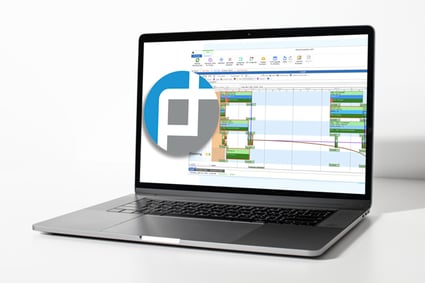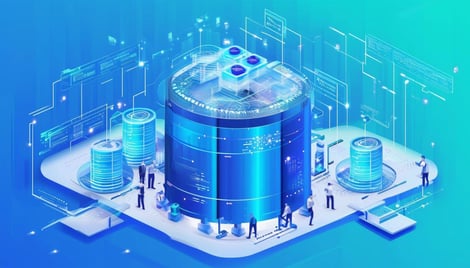Overcoming Data Silos in AI-Powered Supply Chain Planning: Unlocking the Full Potential of Integration
The integration of AI-powered solutions in supply chain planning has transformed the way organizations operate. Yet, one significant challenge continues to hinder efficiency and innovation: data silos. These isolated pockets of data, trapped in disparate systems, prevent the seamless flow of information and insights essential for optimizing supply chain performance.
For Supply Chain Managers in industrial manufacturing, breaking down these silos is critical. Fortunately, tools like PlanetTogether, when integrated with enterprise platforms such as SAP, Oracle, Microsoft Dynamics, Kinaxis, or Aveva, can provide a unified view of operations and pave the way for more effective AI-powered supply chain planning.

Understanding the Challenge of Data Silos
Data silos arise when information is stored in isolated systems or departments that do not communicate effectively. In industrial manufacturing, this often occurs due to legacy systems, departmentalized operations, or the lack of integrated software solutions. These silos create numerous problems, including:
Limited Visibility: Decision-makers lack a holistic view of supply chain activities, leading to inefficiencies and delayed responses.
Inconsistent Data: Conflicting information between systems results in errors, miscommunication, and suboptimal planning.
Inhibited AI Functionality: AI algorithms thrive on comprehensive, high-quality data. Silos reduce the effectiveness of AI by limiting its access to diverse and relevant datasets.
For example, a production planning system might house data on raw material availability, while a separate procurement system tracks supplier performance. Without integration, AI cannot effectively analyze these data points to optimize procurement strategies or inventory management.

The Role of AI in Supply Chain Planning
AI has emerged as a game-changer for supply chain planning, offering capabilities such as:
Demand Forecasting: Machine learning algorithms analyze historical data and market trends to predict future demand with greater accuracy.
Inventory Optimization: AI helps maintain optimal inventory levels by balancing costs and service levels.
Real-Time Decision-Making: AI-powered tools can respond to disruptions, such as equipment failures or supply chain bottlenecks, in real-time.
Risk Mitigation: AI identifies potential risks and provides recommendations to minimize their impact.
However, the effectiveness of these AI-powered solutions hinges on their ability to access and process data from all relevant sources. This is where integration comes into play.

The Power of Integration: PlanetTogether and Enterprise Platforms
By integrating PlanetTogether with enterprise platforms such as SAP, Oracle, Microsoft Dynamics, Kinaxis, or Aveva, industrial manufacturers can create a connected ecosystem that eliminates data silos. Here’s how integration can address the challenges posed by data silos:
Centralized Data Access
Integration allows PlanetTogether to pull data from various systems into a centralized platform. For example, combining SAP’s robust ERP capabilities with PlanetTogether’s advanced scheduling tools ensures that production schedules are informed by real-time inventory levels, order statuses, and financial data. This centralized access enhances decision-making and aligns supply chain activities.
Data Consistency
When systems like Oracle and PlanetTogether are integrated, they share a common dataset, ensuring consistency across the board. This eliminates errors caused by manual data entry or discrepancies between systems. AI models benefit from clean, unified data, leading to more accurate predictions and insights.
Enhanced Collaboration
Integration fosters collaboration across departments by providing a shared platform for data and communication. For instance, Microsoft Dynamics combined with PlanetTogether enables production planners, procurement teams, and logistics managers to work from a single source of truth. This improved collaboration reduces delays and enhances overall supply chain agility.
Real-Time Insights
With Kinaxis or Aveva integration, PlanetTogether can deliver real-time insights into supply chain operations. AI-powered analytics can monitor disruptions, predict their impact, and suggest corrective actions almost instantly. This capability is particularly valuable in industrial manufacturing, where downtime and delays can result in significant financial losses.

Practical Steps to Overcome Data Silos
To fully leverage the benefits of AI-powered supply chain planning, Supply Chain Managers must take proactive steps to dismantle data silos. Here are some actionable strategies:
Audit Existing Systems
Conduct a thorough audit of all existing systems and identify areas where data silos exist. Assess the compatibility of these systems with PlanetTogether and other enterprise platforms.
Invest in Integration
Work with IT teams to establish integrations between PlanetTogether and ERP platforms like SAP, Oracle, or Microsoft Dynamics. Use APIs or middleware solutions to facilitate seamless data exchange.
Standardize Data Formats
Ensure that all data is stored in standardized formats to enable smooth integration. This might involve reconfiguring legacy systems or adopting data cleansing tools.
Prioritize Real-Time Data
Focus on integrating systems that provide real-time data, as this is critical for AI-powered decision-making. For example, real-time inventory updates from SAP can significantly improve PlanetTogether’s production scheduling capabilities.
Leverage Cloud Solutions
Cloud-based platforms like Aveva can simplify integration and data sharing. Transitioning to cloud solutions enables better scalability and accessibility, ensuring that data is available across the organization.
The integration of AI-powered tools will become increasingly critical. Overcoming data silos is not just about improving efficiency; it’s about unlocking the full potential of AI to drive innovation, sustainability, and competitiveness.
For Supply Chain Managers, the message is clear: prioritize integration to create a connected, data-driven ecosystem. With tools like PlanetTogether and enterprise platforms like SAP, Oracle, Microsoft Dynamics, Kinaxis, or Aveva, the path to a smarter, more resilient supply chain is within reach.
By embracing these solutions, industrial manufacturers can turn their supply chains into strategic assets, capable of adapting to market demands, mitigating risks, and delivering exceptional value to customers. The journey starts with breaking down the barriers of data silos and enabling AI to truly transform the supply chain planning process.
Are you ready to take your manufacturing operations to the next level? Contact us today to learn more about how PlanetTogether can help you achieve your goals and drive success in your industry.
Topics: Industrial Manufacturing, PlanetTogether Software, Integrating PlanetTogether, Improved Demand Forecasting, Optimized Production Schedules, Real-Time Insights, Costs Savings, Centralized Data Access





















LEAVE A COMMENT